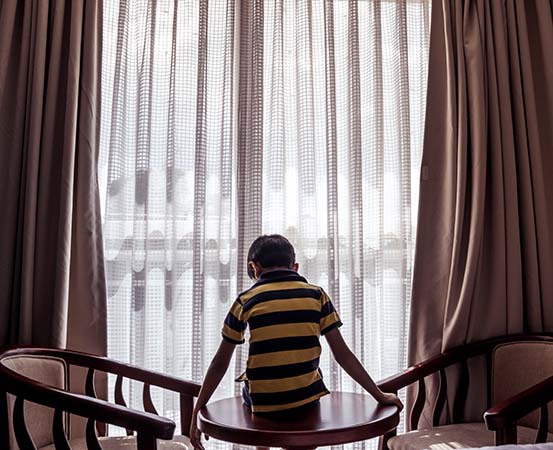
Back in 2013, Rishika Agarwal, a 12-year-old dreamt of life in a boarding school as she was fascinated by hostel life. While her parents were not enthusiastic about sending her away from home, they reluctantly agreed to her wish. Little did she know that she would feel lonely and suffer from homesickness. Experts say that homesickness in kids is a common phenomenon that most kids overcome in a couple of months. But some may suffer from depression and separation anxiety for a longer period.
“I still remember the first time I called home after 21 days in the hostel. I could not utter a word and burst into tears,” Rishika tells Happiest Health.
Separation anxiety in kids: What parents must know
“When one loses a secure environment and is put in an unfamiliar environment, one starts feeling homesick,” says Dr Pratham Dua, a practising child and adolescent psychiatrist from Lucknow.
If a family decides to send a child away for education, the parents must ensure that the child is part of the decision-making process, adds Dr Dua.
Himani Gupte, parenting educator and family counsellor from Nagpur, Maharashtra adds that rationalising the reasons for the sending a child away from home is vital. “Parents need to assure the child that they love them and sending them away is not a punishment but for the benefit of a better education.”
“Homesickness affects grade schoolers, adolescents and even adults if they have always been home or if they have not been primed enough,” points out Dr Dua.
Interestingly, according to Gauramma Nanjappa, Principal at a boarding school KALS, a boarding school at Gonikoppa, near Madikeri in Karnataka, boys experience homesickness for a longer period than girls. “The reason could be the difference in emotional and social traits between girls and boys,” Nanjappa explained.
Kapil Chaudhary, a bank manager from Uttar Pradesh recalls his pangs of homesickness in 2007. At 17, he moved out of Muradabad, Uttar Pradesh for coaching in Kota, Rajasthan. The extreme climate and different food made him long for home. “For the first 15 days, I felt miserable. I barely ate. I missed my mother and her food a lot,” says Kapil.
How can you help your child overcome separation anxiety
Parents play a key role in preparing the child for staying away from home, experts say.
- Preparation for the unknown: Gupte says children always thrive in a predictable environment. Separation from parents and unknown territory creates anxiety about the unfamiliar. “Parents can prepare the child for life in a boarding school or summer camp or even the first day of school. Familiarise the new place for the child with videos of the school or in person school tour,” said Gupte.
- Piecemeal approach: Dr Dua advises parents to prepare a child for a one-night sleepover or a two-day camp. “Parents must ensure their child’s experience is positive and rewarding. Any negative experience would increase the anxiety,” he said.
- Child’s approval: “Communication is the key to preparing any child or adult into moving out of home,” says Gupte. Whether it is sending the child to a summer camp, or boarding school, child’s consent is vital. “This will prepare the child mentally for the transition,” says Dr Dua.
- Clean cut: Dr Dua warns that frequent phone calls can make the child more homesick. Also, he adds, “Parents must not spill over their separation anxiety onto the child, as it discourages the child from adjusting to the new habitat.” Rishika recalls, “In Dehradun hostel, calling home for the first 21 days is barred. After 21 days, we were assigned 60 minutes a month to talk to our family.” She says, “Looking back, I felt, the rule of not calling for 21 days helped me adjust to my new place better.”
Caregivers and teachers can help
Nanjappa gives a few pointers for caregivers to help the homesick child:
-
Create a relaxing and playful environment
Encouraging play time, creating ample co-curricular opportunities, short picnics or treks to nearby areas can help the child acclimatise.
-
Provide good quality basic needs
“Food creates love for the place. Hence good and sufficient food is the key to make them like the new place,” says Nanjappa.
-
Peer support
Though in-house teachers are available as guardians, peer support is necessary. Nanjappa explains, “new boarders are assigned old boarders as buddies to assist them with the new surroundings.” Rishika points out that the buddy she was assigned helped her feel at home in the hostel. Kapil adds ‘Kota was good because of my flatmates.’

Anxiety unresolved: When your child is not okay
Gupte points out, anyone irrespective of age will take about 10-12 days to adjust to a new place. “It is worrisome when homesickness becomes extreme and the child shows depression, anxiety or physical symptoms,” Dr Dua adds.
Parents and caregivers need to assess situations like bullying, violence or other negative experiences.
Dr Dua points out the signs of extreme homesickness:
- Problematic behaviour (social isolation for an introvert child and aggression in an extrovert)
- Decline in academic performance.
- Problems with sleeping
- Issues with appetite
- Headaches
Takeaway
- Homesickness is a regular phenomenon. Loss of a secure environment and being in an unfamiliar environment makes one homesick.
- Homesickness is extreme when the child shows depressive, anxiety or physical symptoms.
- Parents, caregivers and peers play a key role in helping a child overcome homesickness.

















